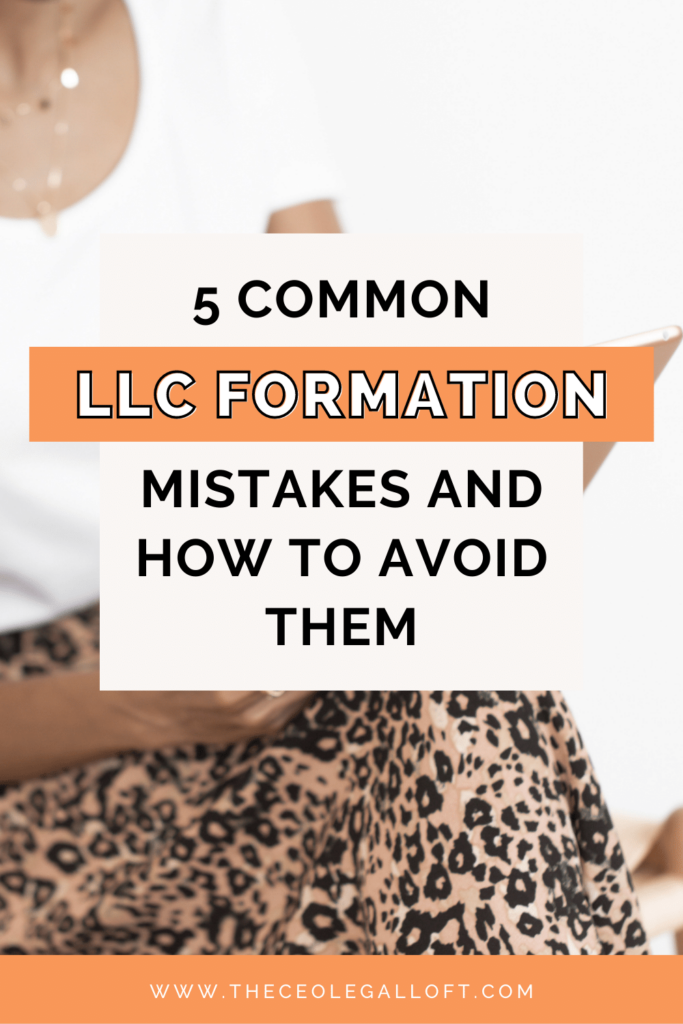Starting a business is exciting until you realize there are so many moving parts . But with any kind of success, you’ll want to protect your assets and make sure that you are building the business in the correct way. There are a number of ways to do this, but one of those is by forming a Limited Liability Company (LLC). Through this article I’ll be covering five common LLC mistakes to avoid when setting up an LLC. While these tips apply to members and managers of most businesses, they definitely apply to LLCs as well.
What is an LLC?
A limited liability company, or LLC, is a type of business structure in the United States. LLCs are a hybrid of both corporations and partnerships. Like corporations, LLCs have limited liability for their owners. This means that the owners are not personally responsible for debts and liabilities of the LLC. However, like partnerships, LLCs are pass-through entities. This means that the LLC itself does not pay taxes on its income. Instead, the profits and losses are “passed through” to the owners and reported on their personal tax returns.
What are the risks of owning an LLC?
There are a few risks associated with owning an LLC.
Risk 1: You may be held personally liable for debts or lawsuits against the LLC if you’re not properly separating yourself from the business.
Risk 2: It may be harder to get financing from banks or other financial institutions because they may see the LLC as a higher-risk investment.
Risk 3: If the LLC does not follow proper corporate formalities, it may be dissolved by a court.
#1 A common LLC mistake is not taking advantage of all the tax benefits.
Forming an LLC helps business owners avoid the double taxation problems of corporations.
The IRS considers an LLC a pass-through entity.Business owner’s must record business income or losses on their personal tax return. However, there may come a time where this is no longer beneficial.
Not electing S-Corp status is a common LLC mistake that many business owners make. By electing S-Corp status you’ll save money on self employment taxes (Social Security and Medicare). Here’s a great example from Collective:
Mel, a consultant, forms an S Corp that earns $100,000 in profit. Her corporation pays her $60,000 in employee wages and bonuses. The remaining profits pass through the S Corp and are reported as a distribution on Mel’s personal income tax return (not as employee wages).
But because it isn’t viewed as employee wages, neither Mel nor her corporation pay employment tax on this amount. Mel and her business only pay a total of $9,100 in employment taxes instead of $15,300.
Similarly, if you make any loans to the business and it fails in the future, you may be able to claim a deduction on some or all of these loans on your personal taxes.

#2 Failing to create an operating agreement.
This is a common LLC mistake that may keep you from approval for loans, grants, leases, and more.
- What happens if you don’t have an operating agreement?
As a new LLC owner, you’re probably thinking your business will go on forever. But what happens if you or your partners want to sell the company or bring in new partners? What if someone dies or becomes disabled? Or what if there’s a disagreement that needs resolving? You’ll be glad then that you have an operating agreement, which acts as an instruction guide for these different scenarios.
- Where can I find professional help to create one?
If you don’t want to do this on your own, there are plenty of professionals who can help. All you need to do is a Google Search for business attorneys in your state. Each state may have a different requirement for their operating agreement. Or if you know an attorney, they may have a referral for you.
- Why is it important to create an operating agreement?
The importance of having an operating agreement comes from the fact that it makes owning and running an LLC so much easier, By having an operating agreement:
It establishes the ownership structure of the company
The operating agreement specifies how many owners (or members) there are in the company and who they are. It also states what percentage of ownership each member has in the company. For example, if there are three members with equal ownership stakes, each person would own 33.33% of the LLC.
It outlines duties and responsibilities
This part is usually pretty straightforward with most companies having just one member who does everything from setting up bank accounts to paying taxes to running day-to-day operations. However, if there’s more than one owner, the duties and responsibilities can sometimes get messy unless they’re
It documents how your LLC will run.
Without one, you risk exposure to lawsuits against the LLC. Consequentially, important rights taken away from you in court decisions.
An operating agreement helps protect members against personal liability for debts and obligations that are supposed to be paid by their LLC.
If there are multiple members of an LLC, there appears to be more of a barrier that separates yourself from the business, because you have to consult with others to take action in the business.
But, as a single member LLC, it’s much harder to prove that your business is separate from you and one way to do this is by having certain documentation including an operating agreement.
- How can I create my own operating agreement?
If you plan on creating the document by yourself, here are some clauses to include:
✔ Name, registered agent and business address.
✔ Business purpose. State the reason why you are forming this LLC.
✔ Member contributions. State how much each person is contributing to start it up and how much they will contribute every year after that.
✔ Who can be a member.
✔ Profits, losses and taxes. Explain where the business profits go, who pays for business losses and what kind of taxes the LLC has to pay. This can also include who gets taxed for business profits and losses, such as if the members get taxed or only the LLC itself does.
✔ Management structure. Describe how the company is managed, such as that only one manager runs it or if there are multiple managers in charge of different areas of it. Also explain how members make decisions about it, such as if all members must vote on everything or if there are certain decisions that only managers can make without any votes from other members.
✔ The responsibilities of each member and manager.
✔ The percentage of ownership each member has.
But if you want a plug and play solution, you can purchase an attorney drafted operating agreement in the LLC docs bundle we’ve created on The CEO Legal Loft.

#3 You aren’t keeping your operating agreement up-to-date.
Most business owners create an operating agreement and forget about it. To fix this common LLC mistake, you need to keep your operating agreement up-to-date for many reasons. If a member leaves the LLC, for example, the operating agreement may need to be amended in order to reflect this change. To ensure that your LLC continues to operate in compliance with state law and any changes you make to the LLC, you’ll want to review and update your operating agreement periodically.
Although it may seem like a hassle, keeping your operating agreement up-to-date is an essential part of keeping your business running smoothly and efficiently.
#4 You don’t understand how to properly file your LLC taxes.
Business owners often make the mistake of not understanding how to properly file their LLC taxes. Since the IRS doesn’t recognize LLCs as a tax entity.
If you’re a single member LLC, you’re considered a disregarded entity (same as a sole proprietorship), and you’ll need to file a Schedule K. If you’re a multi-member LLC, you’ll be taxed as a partnership, and you’ll need to file Form 1065. Lastly, an LLC can elect to be classified as an association taxable as a corporation or as an S corporation.
Also it’s important to keep records of all your business income and expenses as well as a record of all the assets you own and their value. You may need to file an additional tax return for your LLC with certain states, or for other federal or state filings. If you’re unsure about the process, be sure to contact an accountant with questions or concerns before filing taxes.
#5 Failing to keep your personal and business finances separate.
Keeping your finances separate is one of the most common LLC mistakes. To keep yourself on solid legal and financial footing, you need to separate your business and personal finances. That means not just keeping your business and personal expenses separate, but also maintaining completely separate business and personal bank accounts.
If you don’t keep your personal and business finances separate, you could lose the protection of limited liability status (which would place your personal assets at risk). And if you’re audited by the IRS, not having clear separation between your books can raise questions about whether or not the IRS considers you a hobbyist or a real entrepreneur.
Takeaway: These common LLC mistakes often result from inexperience, so it’s important to know what they are and avoid them.
Common LLC mistakes often result from inexperience and lack of knowledge. The good news is that you can avoid most of these mistakes by learning what they are, being careful to avoid them, and having a plan to correct them if they do occur. For a more comprehensive guide on forming your LLC, pick up our e-book The LLC Launch. This guide discusses how to form your LLC, get your EIN for free, the insurance you need, how to transfer your LLC, and so much more.


+ show Comments
- Hide Comments
add a comment